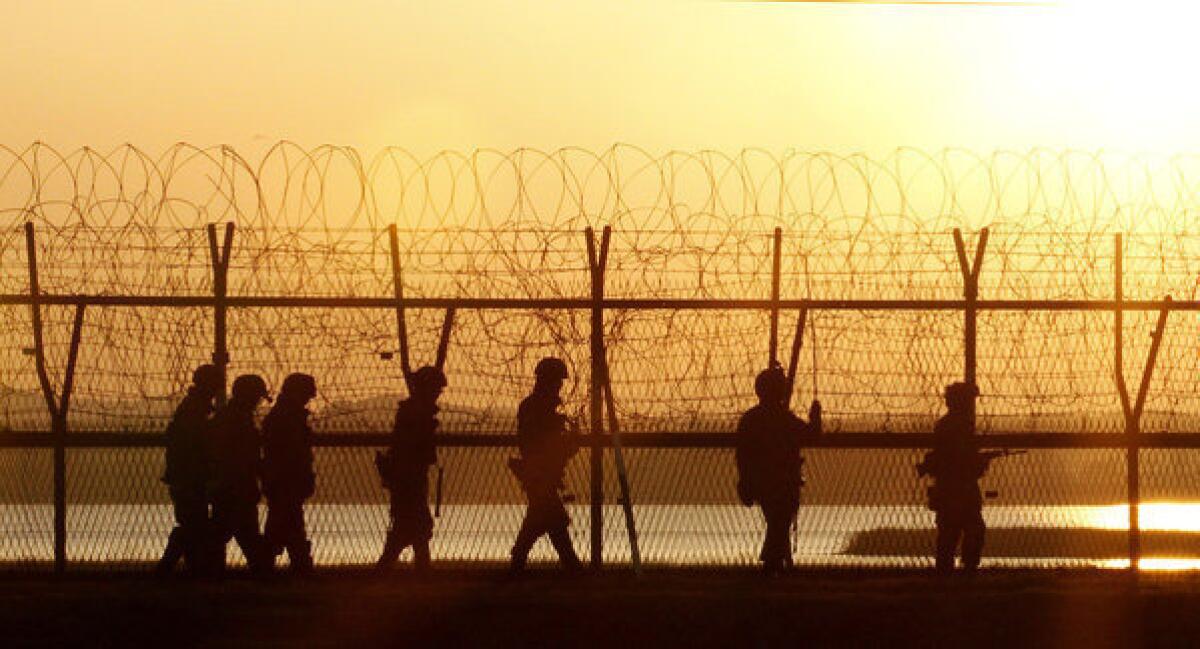North Korea cuts off hotline, says cease-fire annulled

- Share via
SEOUL — In the latest sign of heightened tensions on the Korean peninsula, Pyongyang cut off a hotline between North and South Korea and said it had torn up the nations’ cease-fire accord, signed in 1953, after the U.S. and South Korea kicked off joint military drills at midnight.
The 11-day drill, dubbed “Key Resolve,” is an annual exercise involving more than 13,000 U.S. and South Korean troops who rehearse for a possible conflict in the region. Last week, a North Korean agency in charge of border affairs with the South announced it would void the armistice ending the Korean War and sever the phone link if the drills were carried out as planned.
North and South Korean officials normally exchange telephone calls twice a day via the hotline in the demilitarized zone separating the countries, calling around 9 a.m. and 4 p.m. to mark the beginning and end of work hours. On Monday, South Korea’s Unification Ministry confirmed that attempts to contact the North by telephone at 9 a.m. had failed.
The Monday edition of the North Korean party newspaper, Rodong Sinmun, announced the annulment of the cease-fire agreement and said the “time for the final showdown has arrived.” The state-run Committee for the Peaceful Reunification of Korea called the drill “the most blatant provocation” and said the area was now “without brakes to stop war.”
However, South Korea appeared to be unaffected by the belligerent talk. Local newspapers reported that dozens of teams of military officials played golf at a military course over the weekend, spurring criticism from the president over “slackening” discipline.
Though Seoul, the South Korean capital, is only 35 miles south of the border, there was no sense of panic Monday. “I wasn’t even aware of the latest provocations by North Korea because I was too busy with work,” architect Ran Kim, 27, told The Times.
“They are like that lying shepherd from the tale,” Ran said, comparing the North Koreans to the boy who cried wolf.
The Koreas are technically still at war and have been for decades because no permanent peace treaty was signed after the Korean War. However, a top United Nations spokesman and a South Korean unification official said Monday that the cease-fire remains in force and that no single party can dissolve it.
Besides, “North Korea has already broken the nonaggression pact in 2010” with the deadly shelling of the South Korean island of Yeonpyeong, said Dr. Park Syung-je, an analyst with the Seoul-based Asia Strategy Institute. “So their threat to annul the peace agreement doesn’t hold much meaning.”
Pyongyang has repeatedly declared it is abandoning the armistice and presumably followed through, according to research by Stephan Haggard and Marcus Noland. North Korea also cut the phone link in 2008 and 2010; the two countries still have at least two other channels of communication open, the Associated Press reported.
The escalating threats have prompted some added anxiety this time, however, because they come under a unpredictable new young leader, Kim Jong Un, who assumed power more than a year ago after the death of his father.
North Korea proceeded in December with a hotly disputed rocket launch, believed by Western officials to be a way of testing its ballistic missile technology, and upped the ante last month by carrying out its third nuclear test. As the United Nations moved ahead with new, tighter sanctions, the North’s military threatened to make Washington “a sea of fire.”
White House Press Secretary Jay Carney said that the Obama administration was “certainly concerned by North Korea’s bellicose rhetoric” and that such threats “will only further isolate North Korea and undermine international efforts to ensure peace and stability in Northeast Asia.”
North Korea experts have repeatedly cautioned that the aggressive talk from Pyongyang is nothing new. Park said the new round of fiery threats “doesn’t hold much meaning.”
“If the U.S. were to strike, that would be the end of Kim Jong Un. The North is aware of this — they are not that reckless,” he said.
As tensions simmered, South Korea appointed a new minister of unification, former North Korea studies professor Ryoo Kihl-jae. In his inaugural address Monday, he stressed the importance of talks between the Koreas and said adhering to past agreements was “vitally important.”
“Only if there is trust can meaningful exchange and cooperation take place,” Ryoo said.
ALSO:
Charges are dropped against Kenyan suspect
Al Qaeda affiliate in Iraq says it killed Syrian soldiers
As conclave nears, front-runners emerge in search for new pope
Emily Alpert in Los Angeles contributed to this report.
More to Read
Sign up for Essential California
The most important California stories and recommendations in your inbox every morning.
You may occasionally receive promotional content from the Los Angeles Times.










